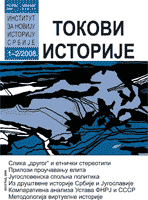ТРУМАНОВА ДОКТРИНА, ГРЧКА И ЈУГОСЛОВЕНСКЕ РЕАКЦИЈЕ (1947–1949)
The Truman Doctrine, Greece and Yugoslav Reactions (1947−1949)
Author(s): Milan RistovićSubject(s): History
Published by: Institut za noviju istoriju Srbije
Keywords: Greece; Civil War; Great Britain; USA; Yugoslavia; Truman Doctrine; Cold War
Summary/Abstract: The inclusion of Greece into the American strategy of strengthening of the „Northern Tier“ by launching of the Truman Doctrine was very important for the further course of the civil war gripping this Balkan country since the spring of 1946. Like other countries in the Soviet sphere of infl uence, Yugoslavia greeted the new American doctrine as an expression of the growing imperialist ambitions of the militarily and economically strongest state of the post-war world. It was criticized as tools for stifl ing progressive movements, being particularly dangerous because if found its fi eld of activity in the Balkans. Yugoslav politicians deemed that the American advent to the Balkans in the place of the exhausted British, had created a much more dangerous situation, not only for the cause of the Greek Communists who enjoyed moral and material aid of the neighboring Communist states, but also for their Balkan neighbors, including Yugoslavia which was heavily involved in the Greek crisis. With massive fi nancial and material aid, primarily in military equipment and weapons and under supervision of the American military mission, the Greek National Army was reorganized and the strategy in fi ghting the leftist guerilla was changed. However, this failed to yield the expected results throughout 1947 and 1948. In January 1949 General A. Papagos was appointed the supreme commander of the National Army. He fi nished the reorganization of the Army, fortifi ed the discipline and the morale of the offi cer corps and used effectively large resources of the American military aid for crushing the enemy. During 1949 the renewed and consolidated National Army fi nally defeated the forces of the leftist Democratic Army which signifi ed the end of the civil war. Greece continued building up and modernizing its armed forces by joining NATO (together with Turkey) in 1952, regardless of their „non-Atlantic“ geo-strategic character and continuing to play the role in the Cold War which was assigned them by the Truman Doctrine. The change of course of the Yugoslav foreign policy caused by the split with Soviet Union and turning toward establishing relations with the West, caused the overt criticizing of the Truman Doctrine to gradually disappear from the political and propagandist rhetoric.
Journal: ТОКОВИ ИСТОРИЈЕ
- Issue Year: 2008
- Issue No: 1-2
- Page Range: 84-112
- Page Count: 29
- Language: Serbian

